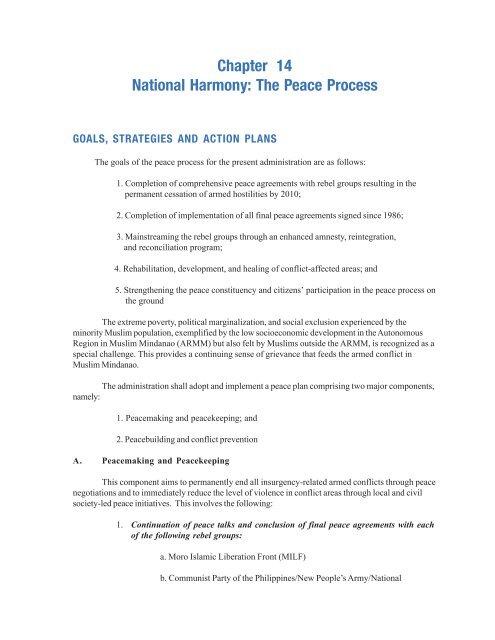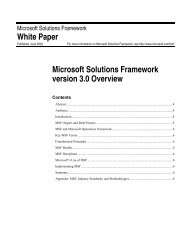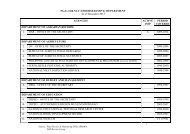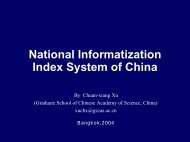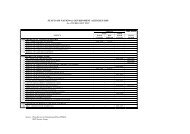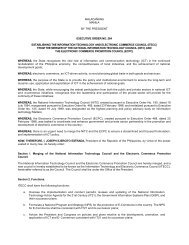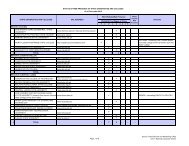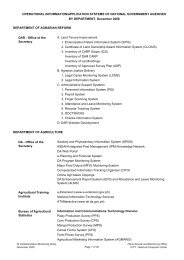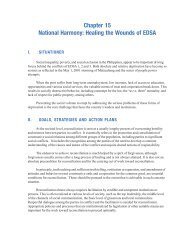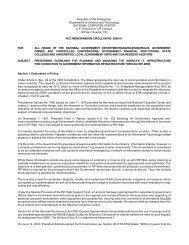Chapter 14 National Harmony: The Peace Process - NEDA
Chapter 14 National Harmony: The Peace Process - NEDA
Chapter 14 National Harmony: The Peace Process - NEDA
- No tags were found...
You also want an ePaper? Increase the reach of your titles
YUMPU automatically turns print PDFs into web optimized ePapers that Google loves.
<strong>Chapter</strong> <strong>14</strong><strong>National</strong> <strong>Harmony</strong>: <strong>The</strong> <strong>Peace</strong> <strong>Process</strong>GOALS, STRATEGIES AND ACTION PLANS<strong>The</strong> goals of the peace process for the present administration are as follows:1. Completion of comprehensive peace agreements with rebel groups resulting in thepermanent cessation of armed hostilities by 2010;2. Completion of implementation of all final peace agreements signed since 1986;3. Mainstreaming the rebel groups through an enhanced amnesty, reintegration,and reconciliation program;4. Rehabilitation, development, and healing of conflict-affected areas; and5. Strengthening the peace constituency and citizens’ participation in the peace process onthe ground<strong>The</strong> extreme poverty, political marginalization, and social exclusion experienced by theminority Muslim population, exemplified by the low socioeconomic development in the AutonomousRegion in Muslim Mindanao (ARMM) but also felt by Muslims outside the ARMM, is recognized as aspecial challenge. This provides a continuing sense of grievance that feeds the armed conflict inMuslim Mindanao.<strong>The</strong> administration shall adopt and implement a peace plan comprising two major components,namely:1. <strong>Peace</strong>making and peacekeeping; and2. <strong>Peace</strong>building and conflict preventionA. <strong>Peace</strong>making and <strong>Peace</strong>keepingThis component aims to permanently end all insurgency-related armed conflicts through peacenegotiations and to immediately reduce the level of violence in conflict areas through local and civilsociety-led peace initiatives. This involves the following:1. Continuation of peace talks and conclusion of final peace agreements with eachof the following rebel groups:a. Moro Islamic Liberation Front (MILF)b. Communist Party of the Philippines/New People’s Army/<strong>National</strong>
180<strong>National</strong> <strong>Harmony</strong>: <strong>Peace</strong> <strong>Process</strong>Democratic Front (CPP/NPA/NDF)c. Rebolusyonaryong Partidong Manggagawa ng Pilipinas/RevolutionaryProletarian Army/Alex Boncayao Brigade (RPMP/RPA/ABB)d. Rebolusyonaryong Partidong Manggagawa ng Mindanao (RPMM)<strong>The</strong> process of peace talks includes the conduct of confidence-building measures, adoption ofinterim or humanitarian ceasefire mechanisms, and negotiations on the substantive agenda constitutingreforms to address the roots of the armed conflict. <strong>The</strong> final peace agreement will also involve apolitical settlement and an agreement on the final end of hostilities and disposition of forces.2. Complementary measures to minimize the level of violence arising from armedconflicts.Government shall encourage, recognize, respect, and support grassrootspeacekeeping initiatives by civil society or local government units (LGUs), especiallythe community declaration of peace zones and other “spaces” for peace, citizens’campaigns for and monitoring of ceasefire agreements, and localized peace talks. Inconflict-affected indigenous communities, traditional or indigenous mechanisms forconflict settlement shall be tapped. Information education to promote nonviolentmeans of conflict resolution shall likewise be undertaken.3. Full implementation of existing final peace agreements, particularly the (a)Government of the Republic of the Philippines (GRP) and the Moro <strong>National</strong>Liberation Front (MNLF) <strong>Peace</strong> Agreement of 1996, and (b) GRP- CordilleraPeople’s Liberation Army (CPLA) <strong>Peace</strong> Agreement of 1986. <strong>The</strong> former shallinvolve the full implementation of Republic Act (RA) 9054, or the new Organic Actfor an expanded ARMM; and the provision of livelihood/direct developmentassistance to unserved MNLF state commands and Bangsamoro women’scooperatives.4. Implementation of an enhanced and integrated reintegration, rehabilitation, andamnesty program to mainstream former rebels into society.An Amnesty and Reintegration Commission (ARC) shall be established in lieuof the <strong>National</strong> Amnesty Commission and shall be placed under the supervision of theOffice of the Presidential Adviser on the <strong>Peace</strong> <strong>Process</strong> (OPAPP). <strong>The</strong> ARC shallintegrate the management of all national programs and services for formercombatants and work closely with concerned LGUs to take a leading role in thereintegration program in their own localities.B. <strong>Peace</strong>building and Conflict PreventionThis component seeks to address the major causes of insurgency. It also aims to eliminatesources of grievance, transform conflict-affected communities into peace and development areas, andheal the social wounds brought about by the long-drawn internal armed conflicts. This shall constitutethe streamlined and enhanced Mindanao <strong>National</strong> Initiatives (MINDANAO NATIN), which shall becomposed of the following:
Medium-Term Philippine Development Plan 2004-20101. Rehabilitation and development of conflict areasPriority areas shall be identified for accelerated barangay-focusedrehabilitation and development to be undertaken and completed in by 2010. MILFaffectedareas include Palimbang in Sultan Kudarat, the perimeter towns of theformer Camp Abubakar (Barira, Buldon, and Matanog in Maguindanao); perimetertowns surrounding Buliok (Pikit in North Cotabato and Pagalungan and DatuMontawal in Maguindanao), Triple-S/B areas in Zamboanga Peninsula (Siocon,Sibuco, Sirawai and Baliguian); Carmen and President Roxas in North Cotabato;and Damulog in Bukidnon.For affected areas in Muslim Mindanao (which may include MNLFcommunities), the following multidonor-assisted funds will be fully mobilized, such as:ARMM Social Fund for <strong>Peace</strong> and Development, United Nations (UN) Multi-Donor(and successor) Funds, European Union-United Nations Development Programme(UNDP) Fund for Rehabilitating Internally Displaced Persons, and the MindanaoTrust Fund which shall be operational upon the signing of a final peace agreementwith the MILF to cover 150 identified conflict-affected municipalities. <strong>The</strong> Mindanao<strong>Peace</strong> and Development Fund shall be activated to cover conflict areas outside theARMM.Priority NPA-affected areas will include influenced barangays in Regions IIIand IV which are closest to the <strong>National</strong> Capital Region (NCR), barangays in theBicol region, Mindoro and Samar islands, and Surigao provinces and CompostelaValley in Mindanao. For the RPMP, 100 priority barangays have been identifiedmostly located in the Negros provinces and Panay island, while around 76 prioritybarangays in the Lanao provinces, Agusan provinces, and Maguindanao have beenidentified for the RPMM. In the absence of a major donor-assisted fund to coverthese areas, Kapit-Bisig Laban sa Kahirapan (KALAHI), under the supervision ofthe <strong>National</strong> Anti-Poverty Commission, will continue to be mobilized and strengthened.Mission funds, particularly of the European embassies in Manila, shall also be tappedas a quick-response source of assistance.<strong>The</strong> delivery of core shelter units and immediate livelihood assistance fordisplaced families shall be prioritized. Infrastructure and basic services for conflictaffectedcommunities i.e. access roads, schoolbuilding and teachers, potable water,electricity, and multipurpose center shall also be targeted.2. Catch-up development program for ARMM and affirmative action agenda forMuslims. <strong>The</strong> catch-up development program for ARMM will focus on :a. Completion of the devolution of national agencies to the ARMM inaccordance with RA 9054.Among the agencies still to be devolved and which have beenapproved by the Oversight Committee are the Department of PublicWorks and Highways, Regional Police Commission/ Regional PoliceForce (REPOLCOM/RPF), Bureau of Jail Management and181
<strong>National</strong> <strong>Harmony</strong>: <strong>Peace</strong> <strong>Process</strong>Penology/ Bureau of Fire Protection (BJMP/BFP), Department ofEducation (DepEd), Department of Interior and Local Government,Department of Agrarian Reform (DAR), Cooperative DevelopmentAuthority, Department of Social Welfare and Development, andCommission on Higher Education.b. Budget reform to enhance fiscal autonomy.To strengthen the ARMM’s capacity to generate revenues,two specific measures have to be accomplished, namely:• A Regional Department of Finance in the ARMM shall becreated, with the mandate to mobilize ARMM resources tosupport regional budgetary requirements.• An inventory of all funds that should be made available to theARMM from the budgets of national agencies and lumpsums has been identified. A common protocol or system shallbe established to facilitate the flow of funds from theseagencies to the ARMM.c. Completion of infrastructure for interconnectivity of ARMM-constituentprovinces and city and of affirmative action roads to provide access toremote conflict-affected areas.d. Catch-up plan for health and education to raise the Human DevelopmentIndex.This involves the implementation of culturally-responsive programs inpublic health and the provision/improvement of appropriate infrastructures,complementary supplies and equipment, including the effective managementof these services. On the other hand, a Madrasah education program will beimplemented by the DepEd consisting of curriculum development, training ofmadaris teachers, and a catch-up plan for Muslim students.(<strong>Chapter</strong> 18: Education)e. Filling up of all vacancies and support for effective operation of shariahcourts.This will necessitate the reactivation of the Search Committee toidentify qualified candidates and, possibly, the conduct of continuous educationprograms to upgrade their competencies and skills.f. Land tenure improvement for actual occupants.To address claims on land and resolve existing conflict in land claims,a land tenure improvement program to be piloted by the Office on Muslim182
Medium-Term Philippine Development Plan 2004-2010Affairs (OMA) in coordination with the concerned agencies will identify landownership and facilitate the generation of land titles. In addition, a One-StopAction Center for Titling Assistance for Muslim Minorities, which wasinitiated by the DAR for Region XII, shall be continued and may be expandedin cooperation with the ARMM.g. Enhanced agricultural productivity program.Consistent with the effort to make Mindanao the country’s agrifisheryexport zone, the development of the ARMM as the Halal-based foodproduction and processing center shall be supported. <strong>The</strong> region’s agriculturaland fishery production centers shall be linked cost-effectively through theprovision of adequate transport and communications services andinfrastructures. (<strong>Chapter</strong> 2: Agribusiness)h. Support for the implementation of “<strong>The</strong> ARMM Special Economic ZoneAct of 2003,” which created the Regional Economic Zone Authority(REZA) to oversee the establishment and operations of special economiczones, industrial estates, export processing and free trade zones in theARMM.Support shall be given to ARMM-Department of Trade and Industry,which functions as the REZA in the transition period, to explore and launchpilot economic zones. This may range from industrial-type estates, whichrequire huge development incentives, to municipal or even barangay-level freezones. <strong>The</strong> implementation of Polloc, Parang, Maguindanao as an ecozone,as designated by the Phlippine Special Economic Zone Act of 1995 (RA7916), shall also be studied.i. Holding of peaceful, orderly and meaningful elections in the ARMM inAugust, 2005, and August, 2008, in accordance with RA 9333.<strong>The</strong> affirmative action agenda for Muslims to eliminate cultural biases throughout the country,will focus, among others, on:• Proportionate share of appointments to senior government positions;• Rehabilitation/entry of Islamic banking;• Creation of salaam police units for NCR and urban centers;• Ensuring non-discriminatory policies and procedures in any police/military action againstterrorism;• Improved Hajj supervision;• Promotion of Muslim holidays and religious festivals through official declarations and conductof awareness program on these important events;• Policies to ensure elimination of discrimination, even affirmative action, in schooling andemployment; and• Streamlining and strengthening of OMA.183
<strong>National</strong> <strong>Harmony</strong>: <strong>Peace</strong> <strong>Process</strong>3. Conduct of healing and reconciliation programs in conflict-affectedcommunities.<strong>The</strong>se shall include the conduct of community-based interfaith andintercultural peace education and advocacy campaigns; trauma counseling andrehabilitative services for displaced families, especially women and children victims ofarmed conflict; and holding of community rituals and traditional practices forcleansing, healing, and reconciliation.184


